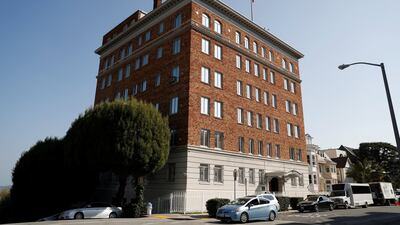The US state department ordered Russia to close three of its buildings in the US, including its consulate in San Francisco. The instruction is in retaliation for Russia telling Washington in July to cut staff at its embassy and consulates.
“We are requiring the Russian government to close its Consulate General in San Francisco, a chancery annex in Washington, DC and a consular annex in New York City,” state department spokeswoman Heather Nauert said on Thursday. “These closures will need to be accomplished by September 2.”
The move comes after Russia directed the US to cut staff at its diplomatic missions in Russia by 755, or nearly two-thirds, following congressional approval of tougher sanctions against Moscow. At the time, Russian president Vladimir Putin said he hoped there would be no need for further reprisals but secretary of state Rex Tillerson later vowed to respond by September 1.
The tit-for-tat response iillustrates the deterioration in relations between Washington and Moscow in the seven months since President Donald Trump came to office promising to improve ties with Russia. Yet the two countries countries to be at odds on all key issues, from Syria to tighter sanctions on North Korea.
“We waited for a rather long time, thinking that things might improve, nourished the hope that the situation would change somehow,” Mr Putin said in an interview with Russian state television in July. “But by all indications, if it does change, it won’t be soon.”
Moscow made its move soon after the US senate overwhelmingly passed a bill on July 27 preventing the president from easing sanctions on Russia without the approval of congress and also paved the way for more restrictions. President Trump later signed the bill
Mr Tillerson and his Russian counterpart, Sergei Lavrov have frequently exchanged sharp words. Still, Mr Tillerson says it is unacceptable for two major nuclear powers to remain in such a continuous state of tension, and insists the US wants to improve relations. However,, a rapprochement looks increasingly far away.

